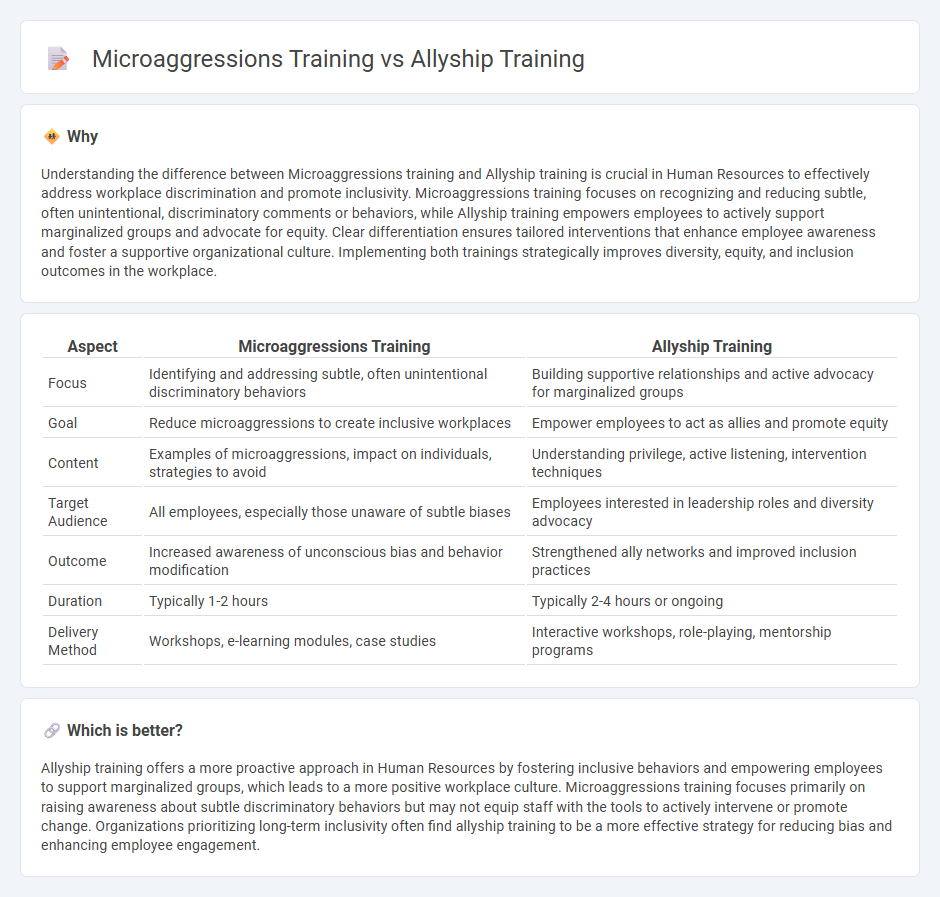
Microaggressions training focuses on identifying and addressing subtle, often unintentional discriminatory comments or behaviors that marginalize individuals in the workplace, promoting a more inclusive environment. Allyship training emphasizes active support and advocacy for underrepresented groups, empowering employees to foster genuine inclusion and equity. Discover how implementing both can transform your organizational culture and enhance employee engagement.
Why it is important
Understanding the difference between Microaggressions training and Allyship training is crucial in Human Resources to effectively address workplace discrimination and promote inclusivity. Microaggressions training focuses on recognizing and reducing subtle, often unintentional, discriminatory comments or behaviors, while Allyship training empowers employees to actively support marginalized groups and advocate for equity. Clear differentiation ensures tailored interventions that enhance employee awareness and foster a supportive organizational culture. Implementing both trainings strategically improves diversity, equity, and inclusion outcomes in the workplace.
Comparison Table
| Aspect | Microaggressions Training | Allyship Training |
|---|---|---|
| Focus | Identifying and addressing subtle, often unintentional discriminatory behaviors | Building supportive relationships and active advocacy for marginalized groups |
| Goal | Reduce microaggressions to create inclusive workplaces | Empower employees to act as allies and promote equity |
| Content | Examples of microaggressions, impact on individuals, strategies to avoid | Understanding privilege, active listening, intervention techniques |
| Target Audience | All employees, especially those unaware of subtle biases | Employees interested in leadership roles and diversity advocacy |
| Outcome | Increased awareness of unconscious bias and behavior modification | Strengthened ally networks and improved inclusion practices |
| Duration | Typically 1-2 hours | Typically 2-4 hours or ongoing |
| Delivery Method | Workshops, e-learning modules, case studies | Interactive workshops, role-playing, mentorship programs |
Which is better?
Allyship training offers a more proactive approach in Human Resources by fostering inclusive behaviors and empowering employees to support marginalized groups, which leads to a more positive workplace culture. Microaggressions training focuses primarily on raising awareness about subtle discriminatory behaviors but may not equip staff with the tools to actively intervene or promote change. Organizations prioritizing long-term inclusivity often find allyship training to be a more effective strategy for reducing bias and enhancing employee engagement.
Connection
Microaggressions training and Allyship training are interconnected tools in Human Resources aimed at fostering inclusive workplace cultures by increasing awareness of subtle discrimination and promoting proactive support for marginalized groups. Both trainings emphasize empathy, active listening, and accountability to empower employees to recognize biases and advocate for equity. Implementing these programs leads to enhanced employee engagement, reduced conflict, and improved organizational diversity and inclusion metrics.
Key Terms
Allyship training:
Allyship training emphasizes fostering supportive behaviors and proactive advocacy for marginalized groups in the workplace, promoting inclusion and equity through practical strategies. This training equips employees with skills to recognize systemic biases and take meaningful action to create an environment where all voices are valued. Discover more about how allyship training can transform organizational culture and drive social change.
Advocacy
Allyship training centers on empowering individuals to actively support marginalized communities through advocacy, fostering inclusive environments and promoting social justice. Microaggressions training emphasizes recognizing and addressing subtle, often unintentional discriminatory behaviors that undermine inclusivity. Explore our comprehensive programs to deepen your understanding and strengthen your advocacy skills.
Inclusive Leadership
Allyship training emphasizes developing proactive support and advocacy skills to foster an inclusive leadership culture, while microaggressions training targets recognizing and mitigating subtle, often unintentional discriminatory behaviors in the workplace. Inclusive leadership programs integrate both approaches to enhance empathy, cultural competence, and equitable team dynamics. Explore comprehensive strategies to elevate your organization's inclusive leadership effectiveness today.
Source and External Links
What is Allyship Training? - CultureAlly - Allyship training is a structured program designed to teach individuals how to actively support and advocate for people from underrepresented groups by understanding their experiences, challenging bias, and taking intentional actions to promote equity and inclusion.
How to Develop an Effective Allyship Training Program - Effective allyship training involves assessing personal biases, using collaborative learning technologies, and continuously reinforcing skills through group discussions, scenario practice, and peer support to ensure sustained behavioral change.
Allyship Training & Consulting for Employees & Corporations | Paradigm - Corporate allyship training helps employees grasp the ongoing nature of allyship, equips them with practical strategies for supporting diverse colleagues, and offers expert-led sessions and microlearnings on topics like racial justice, disability inclusion, and inclusive language.
 dowidth.com
dowidth.com